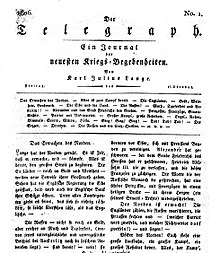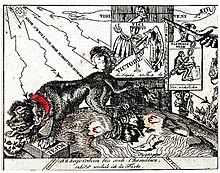The Telegraph (daily newspaper)
The Telegraph , subtitle: A journal of the latest war events by Karl Julius Lange , was the first daily newspaper in Berlin , which was delivered from October 17, 1806 to December 3, 1808, including on Sundays and public holidays. Editor Karl Julius Lange, actually Simson Alexander David , was initially under the influence of the Prussian authorities and planned a propaganda newspaper in their favor, but after the defeat of the Prussian army at the battle of Jena and Auerstedt , which was published in Berlin on the first day of publication of the Telegraph became known, he switched within a few days to the line of the French occupiers and made the paper the most important and most cited German-speaking mouthpiece of Napoleon until the French army withdrew from Berlin .
prehistory
Protected by Minister of State Karl August von Hardenberg , Lange, who was in need of recognition, had made several unsuccessful attempts since 1805 to obtain permission from the responsible cabinet ministry to set up a daily newspaper. The authorities considered the two existing Berlin papers to be sufficient and were extremely suspicious of Lange, as he had purposefully circumvented censorship with his liberal Deutsche Reichs- und Staatszeitung (Bayreuth, 1797–1799), had escaped from custody in Bayreuth twice and had spent a few years in emigration in Denmark ( Altona ), kept afloat by Hardenberg's secret money transfers. Pardoned by King Friedrich Wilhelm III. and frustrated by his existence as a freelance author for aesthetic journals like August von Kotzebue's Der Freimüthige, or Berlinische Zeitung for educated, impartial readers , Lange pushed for his own newspaper. At the end of 1804 he was allowed a paper that was expressly not intended to compete with the daily newspapers and could therefore appear several times a week at best. With the Nordic Mercury. A journal of historical, political and literary content (January to September 1805) attracted Lange's attention and occupied such prominent authors as Jean Paul , but had to hold back so politically that he discontinued the title in autumn 1805. Employed as an assistant for press matters in the Cabinet Ministry, Lange devoted himself to his newspaper Der Telegraph - a journal of the latest war events - from October 21, 1805 . The newspaper made for their frank and well-informed coverage of the War of the Third Coalition between Austria and France immediately Sensation (the Hofpostamt ordered 400 copies and was already planning the sale of 1000), was pressured by the very angry Austrian ambassador Klemens von Metternich but already after a few days because Lange had maliciously commented on the devastating defeat of the Austrians at Ulm (“We don't even owe Austria (…) consolation.”) Nevertheless, Lange was allowed to make another attempt at publication shortly thereafter. In January 1806 his Deutscher Herold, Journal of the Latest World Events, appeared . Since the censorship authorities forbade him to express his opinion personally, Lange gave up this magazine again after 77 issues in March.
The Telegraph from 1806 to 1808
When the war between Prussia and France loomed in the summer of 1806 , the Berlin authorities did not want to forego journalistic help and in October granted Lange a license for a markedly “fatherland” daily newspaper. The State Councilor Johann Emmanuel von Küster recommended Langes “talent, wit and a good pen” and hoped for a powerful propaganda organ. The first issue of the telegraph, dated Friday October 17th, 1806, is said to have been read with great interest. Simultaneously with the delivery of this starting number, however, the first rumors of a crushing defeat of the Prussian army in the capital began to spread. The Telegraph appeared on October 18th with the number 2, but not in the following two days because of the anxious atmosphere and the political confusion. From number 3 (October 21, 1806) onwards, Lange was already cautious and waiting, and with the arrival of Emperor Napoleon in Berlin on October 26, the Telegraph became completely a newspaper under French influence. Napoleon himself, who was just as modern as Hardenberg in terms of press policy, had instructed his head of administration, Louis Pierre Édouard Bignon, on October 31, to make Lange the offer to be able to leave with the French one day and to be allowed to live in France at state expense, if so he made the telegraph the daily communication organ of the occupiers. Obviously, the journalist was convinced, partly out of liberal conviction, partly out of fear, as it was known that the French harshly suppressed unpleasant authors, up to and including death sentences, as in the case of the bookseller Johann Philipp Palm .
From then on, the Telegraph became one of the most important German daily newspapers, hated and adored, but above all read and quoted a lot when it came to documenting the (semi-official) views of the occupiers. The subscription price was nine thalers a year; single issues of usually four pages were only sold for two groschen in exceptional cases. At times (from May 1, 1808) the paper appeared in two daily editions (French / German). Despite the protection of the French, editor Lange does not seem to have earned enough from the paper: At the beginning of 1807 he was threatened with imprisonment in the Berlin bailiff for unpaid debts.
When the telegraph truthfully reported the case of Danzig on May 29, 1807, angry citizens of Berlin threatened to storm the editorial office at Schlossplatz 2. For a long time, soldiers had to protect themselves and from then on they could only walk through the city under guard. Rumor had it that he wanted to give up the telegraph in early 1808, but was urged by the French occupation authorities to remain editor. Plans to add a “literary supplement” to the newspaper were never realized, probably also because the French were not interested in giving up the newspaper's semi-official character. The Telegraph made Europe-wide headlines with its edition of September 18, 1808, when it printed a letter from the Prussian State Councilor Heinrich Friedrich Karl vom und zum Stein , which had been intercepted by the French , from which it emerged that Stein was secretly stirring up an uprising against the French. The sheet was hurriedly brought to Königsberg by a Prussian captain to warn the stone residing there, whereupon he fled to Bohemia.
In fact, Lange, who usually wore a French civil uniform, left Berlin with the French on December 3, 1808, first to the fortress of Stettin , and later to Erfurt . Despite announcements to the contrary, the Telegraph no longer appeared in either city. Napoleon's plan to have the paper published in Düsseldorf also failed.
Journalistic echo
The telegraph was delivered weekly in Königsberg to the Prussian court there, with comments from the Prussian State Councilor Johann August Sack , who represented Prussian interests in occupied Berlin. In the years of its publication, the newspaper caused massive outrage among all "patriotic" authors up to Georg Wilhelm Friedrich Hegel , who published the Bamberger Zeitung at the time . Prominent contemporaries like Karl August Varnhagen von Ense , August von Kotzebue , Heinrich Friedrich Ludwig Rellstab and many others got excited in their memories about the telegraph , "national" writers like Willibald Alexis and Clara Luise Mundt made Lange the negative hero in the novels Peace is the first civic duty (1852) or Napoleon and Luise (1860). Countess Julie Sophie von Schwerin admitted in her memoirs that she was forced to read the telegraph at the beginning, but then stuck with it out of curiosity: "... because you had to know every day what to believe ..." Since then, the journalist has been - incorrectly - the epitome of the opportunist who changes his convictions within days. In fact, he was a democrat throughout his life and this attitude kept clashing with the Prussian government.
literature
- Saul Ascher: Kabinet Berlinischer Karaktere , Berlin 1808
- Georg Friedrich von Cölln: Vienna and Berlin in parallel , Amsterdam and Cölln 1808 (fictitious place of printing)
- Kurt Eisner: The end of the empire. Germany and Prussia in the age of the great revolutions , Berlin 1907
- George (pseudonym): 1805–1815, Memories of a Prussian from the Napoleonic period , Grimma 1840
- Heinrich Friedrich Ludwig Rellstab: From my life , Berlin 1861
- Karl August Varnhagen von Ense: Memoirs , Vol. 1, Frankfurt 1987
Individual evidence
- ↑ Peter Jungblut: A demonized life. Simson Alexander David (1755–1812), the journalist Germany wished to hell , Berlin 2015 (2nd edition)
- ↑ Peter Jungblut: A demonized life. Simson Alexander David (1755–1812), the journalist Germany wished to hell , Berlin 2015 (2nd edition), p. 259
- ^ The Telegraph , October 25, 1805
- ↑ Peter Jungblut: A demonized life. Simson Alexander David (1755–1812), the journalist Germany wished to hell , Berlin 2015 (2nd edition), p. 273
- ↑ Alexander Davidson: The Telegraph . 1806 ( limited preview in Google Book Search).
- ↑ Peter Jungblut: A demonized life. Simson Alexander David (1755–1812), the journalist Germany wished to hell , Berlin 2015 (2nd edition), p. 283
- ↑ The Telegraph, No. 121, April 30, 1808
- ↑ a b Peter Jungblut: A demonized life. Simson Alexander David (1755–1812), the journalist Germany wished to hell , Berlin 2015 (2nd edition), p. 297
- ↑ Peter Jungblut: A demonized life. Simson Alexander David (1755–1812), the journalist Germany wished to hell , Berlin 2015 (2nd edition), p. 305


